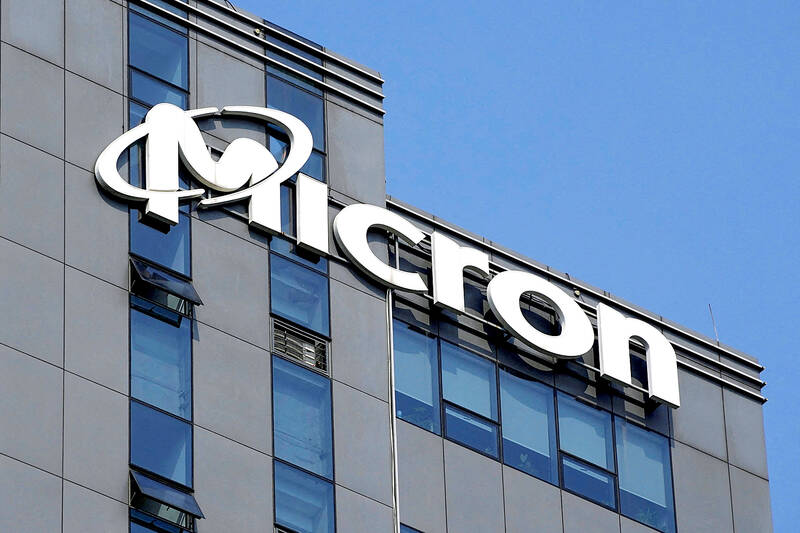Micron Technology Inc is expanding its domestic investment plan to US$200 billion as its seeks to boost US semiconductor manufacturing, with the backing of US President Donald Trump’s administration, the US chip giant said yesterday.
The move, aimed at strengthening America’s domestic chip supply chain, represents an additional US$30 billion beyond Micron Technology’s previous investment commitments and includes plans to build a second leading-edge memory fabrication facility in Boise, Idaho.
The investment plan comes as the US pushes to reduce its reliance on foreign semiconductor production. Memory chips are critical components used in national defense systems, automobiles and national security applications.

Photo: Aly Song, Reuters
The announcement is part of the Trump administration’s broader efforts to secure major investment commitments from technology companies and strengthen US industrial capacity. Since taking office, the Trump has announced corporate investment pledges totaling hundreds of billions of dollars.
Trump has called on companies to create more manufacturing jobs in the US, and threatened to impose crippling tariffs on imports from around the world.
The Idaho-based company said it would invest approximately US$150 billion in domestic memory manufacturing and US$50 billion in research and development over the coming years, creating an estimated 90,000 direct and indirect jobs across multiple states.
Micron Technology said the new investments would modernize its existing plant in Manassas, Virginia, and bring end-to-end high bandwidth memory (HBM) manufacturing capabilities to the US.
Several prominent US tech CEOs were quoted in the announcement statement, stressing the importance of the project.
Nvidia Corp cofounder and CEO Jensen Huang (黃仁勳) called it “an important step forward for the AI ecosystem,” referring to the heavy investments in artificial intelligence by the US tech giants.
Apple Inc CEO Tim Cook also welcomed it, calling it “another great example of American manufacturing leadership, and we look forward to building on our work together.”
Micron Technology said the plan would significantly boost domestic memory manufacturing capacity, with the company aiming to increase the US share of production from nearly zero percent today to 10 percent over the next decade.

In Italy’s storied gold-making hubs, jewelers are reworking their designs to trim gold content as they race to blunt the effect of record prices and appeal to shoppers watching their budgets. Gold prices hit a record high on Thursday, surging near US$5,600 an ounce, more than double a year ago as geopolitical concerns and jitters over trade pushed investors toward the safe-haven asset. The rally is putting undue pressure on small artisans as they face mounting demands from customers, including international brands, to produce cheaper items, from signature pieces to wedding rings, according to interviews with four independent jewelers in Italy’s main

Japanese Prime Minister Sanae Takaichi has talked up the benefits of a weaker yen in a campaign speech, adopting a tone at odds with her finance ministry, which has refused to rule out any options to counter excessive foreign exchange volatility. Takaichi later softened her stance, saying she did not have a preference for the yen’s direction. “People say the weak yen is bad right now, but for export industries, it’s a major opportunity,” Takaichi said on Saturday at a rally for Liberal Democratic Party candidate Daishiro Yamagiwa in Kanagawa Prefecture ahead of a snap election on Sunday. “Whether it’s selling food or

CONCERNS: Tech companies investing in AI businesses that purchase their products have raised questions among investors that they are artificially propping up demand Nvidia Corp chief executive officer Jensen Huang (黃仁勳) on Saturday said that the company would be participating in OpenAI’s latest funding round, describing it as potentially “the largest investment we’ve ever made.” “We will invest a great deal of money,” Huang told reporters while visiting Taipei. “I believe in OpenAI. The work that they do is incredible. They’re one of the most consequential companies of our time.” Huang did not say exactly how much Nvidia might contribute, but described the investment as “huge.” “Let Sam announce how much he’s going to raise — it’s for him to decide,” Huang said, referring to OpenAI

Nvidia Corp’s negotiations to invest as much as US$100 billion in OpenAI have broken down, the Wall Street Journal (WSJ) reported, exposing a potential rift between two of the most powerful companies in the artificial intelligence (AI) industry. The discussions stalled after some inside Nvidia expressed concerns about the transaction, the WSJ reported, citing unidentified people familiar with the deliberations. OpenAI makes the popular chatbot ChatGPT, while Nvidia dominates the market for AI processors that help develop such software. The companies announced the agreement in September last year, saying at the time that they had signed a letter of intent for a strategic